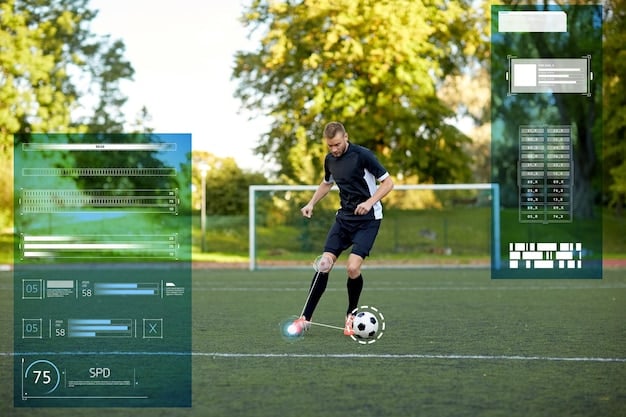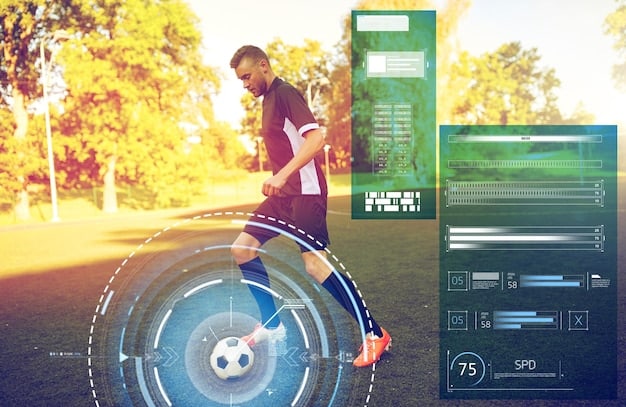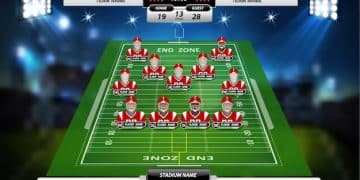FIFA 25: Dominate Career Mode with Player Development (US Guide)

FIFA 25 Career Mode offers US players unprecedented control over player development, with tailored training regimes, skill tree enhancements, and strategic match experience impacting individual player growth and team success.
Ready to turn your FIFA 25 Career Mode team into a dynasty? This is FIFA 25: The Ultimate Guide to Player Development in Career Mode for US Players, packed with everything you need to know to scout, train, and unleash the full potential of your squad.
Unlock Player Potential: FIFA 25 Career Mode Overview
FIFA 25’s Career Mode offers a deeply engaging experience, particularly when it comes to nurturing your players. Understanding the core mechanics is vital for any US player aiming for long-term success.
The key is to focus your efforts effectively, maximizing growth in areas that complement each player’s natural strengths. Let’s dive into these core mechanics.
Understanding Player Roles and Development Plans
Each player in your squad has a designated role (e.g., striker, midfielder, defender). Development plans allow you to tailor their training to fit specific roles or focus on individual attributes.
- Balanced: A general approach that evenly distributes training across all attributes.
- Focused: Concentrates on specific attributes, leading to faster growth in those areas.
- Custom: Allows you to create a personalized training program targeting particular skills and weaknesses.
Choose wisely. Consider the player’s potential, current skills, and your team’s tactical needs.
In conclusion, a balanced approach to player development considers their role, personal goals, and how they fit into your overall team strategy.

Mastering Training: Drills and Regimens
Training is the engine that drives player development in FIFA 25 Career Mode. Selecting the right drills and managing training regimens are crucial to unlocking your players’ full potential.
The choices you make here will directly influence how quickly and effectively your players’ skills improve.
Effective Training Drills for Attribute Boosts
FIFA 25 provides a variety of training drills, each targeting specific skills. Here’s a breakdown of some effective drills:
- Shooting: Finishing Frenzy, Precision Shooting, Advanced Finishing. Good for improving finishing, shot power, and long shots.
- Passing: Short Passing, Crossing, Vision Training. Ideal for boosting short passing, long passing, and crossing accuracy.
- Dribbling: Dribbling Course, Agility Training, Skill Games. Best for increasing agility, balance, and dribbling skills.
Prioritize drills that match the player’s development plan and address their weaknesses.
Ultimately, successful training is about finding the right balance between individual needs and team objectives.
Youth Academy Secrets: Finding Future Stars
The Youth Academy is your source for discovering the next generation of soccer superstars. Effective scouting and smart recruitment will give you a competitive edge in Career Mode.
Let’s explore some key strategies for finding and developing young talent.
Scouting Networks: Expanding Your Reach
Invest in a strong scouting network to uncover hidden gems around the world. Send scouts to different regions, focusing on countries known for producing quality players.
Here are a few tips for optimizing your scouting efforts:
- Target specific positions: Tell your scouts to look for players in positions where your team needs strengthening.
- Set age ranges: Focus on young players with high potential, typically between 15 and 18 years old.
- Check scout reports regularly: Evaluate the scout reports to identify promising prospects and invite them to your academy.
Don’t underestimate the power of a well-managed scouting network in building a sustainable team for the future.

Match Experience: Game Time and Skill Growth
While training is essential, game time is equally critical for player development. Strategic player selection and smart squad rotation can accelerate growth, particularly for younger players.
Let’s discuss how to use match experience effectively to nurture talent.
Managing Playtime for Optimal Development
Giving young players regular playing time is crucial, but it must be managed carefully. Start them in easy matches or bring them on as substitutes to build their confidence and skills.
Consider these strategies for managing playing time:
- Loan spells: Send promising youngsters on loan to clubs where they will get regular game time.
- Rotation policy: Rotate your squad to give all players opportunities to play.
- Monitor performance: Track player performance to identify areas for improvement and adjust training accordingly.
Remember, match experience is invaluable for developing well-rounded players who can perform under pressure.
In summary, the combination of planned training and game time is the best way to improve the statistics of your players.
Contract Negotiations: Securing Your Stars
Proper contract management is vital to keeping your key players happy and preventing them from leaving for free. Understanding contract negotiations is crucial for long-term success.
Let’s delve into the best practices for securing your star players’ futures.
Negotiation Tactics: Keeping Players Happy
When negotiating contracts, consider the player’s value to the team, their current form, and their expectations. Offer competitive wages, signing bonuses, and release clauses that reflect their worth.
Here are some tips for successful contract negotiations:
- Start early: Begin negotiations well before the player’s contract expires.
- Be flexible: Be willing to compromise on wages and clauses to reach an agreement.
- Communicate openly: Maintain open communication with players and their agents to build trust.
Fostering positive relationships with your players and their representatives can smooth the negotiation process and secure their long-term commitment to your club.
In conclusion, the right salary is one of the key factors that influence the player’s agreement to sign or extend the contract.
Overcoming Challenges: Injuries and Morale
Injuries and low morale can derail even the best-laid development plans. Managing these challenges effectively is crucial to maintaining player growth and team performance.
Let’s explore some strategies for mitigating these setbacks.
Strategies for Managing Injuries and Maintaining Morale
Preventing injuries and boosting morale requires a proactive approach.
Follow these tips:
- Rotation: Rotate your squad to prevent player fatigue, reducing the risk of injuries, especially those with stamina issues.
- Training intensity: Adjust training intensity to avoid overexertion.
- Team talks: Conduct regular team talks to address morale issues and foster a positive team environment.
In short, be proactive when taking care of player’s stats and wellness.
| Key Aspect | Brief Description |
|---|---|
| ⚽ Training Drills | Focus on drills matching a player’s development plan to quickly boost key attributes. |
| 🌟 Youth Academy | Invest in scouts, target positions, and regularly analyze reports to find potential stars. |
| ⏱️ Match Time | Strategic playtime, loan spells, and squad rotation are crucial for young player growth. |
| 🤝 Contract Talks | Proactive negotiations and understanding player expectations will keep your squad happy. |
FAQ
▼
Focus on targeted training drills that match the player’s position and development plan. Regular playtime also helps, especially in easy matches.
▼
Invest in high-quality scouts and send them to regions known for producing talent. Specify the positions and age range you’re looking for.
▼
Match experience is crucial. It helps players apply their training in real game situations, improving their decision-making and performance under pressure.
▼
Offer competitive wages, signing bonuses, and reasonable release clauses. Also, communication is the key to building a good relation.
▼
Injuries stall development. Employ squad rotation to prevent fatigue and adjust training intensity to reduce injury risks.
Conclusion
Mastering player development in FIFA 25 Career Mode requires a strategic blend of training, scouting, match experience, and contract management. US players who embrace these strategies will transform their teams into powerhouses, dominating the competition for years to come.





